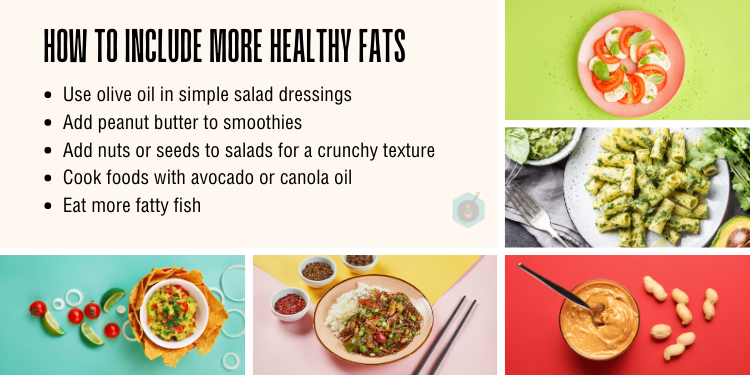Essential Macronutrient: Dietary Fat
Dietary Fat: Know the Facts
1. What are fats?
Fats are fatty acids categorized into saturated, monounsaturated, and polyunsaturated. However, ALL FATS have a combination of saturated, monounsaturated, and polyunsaturated fats.
In other words, butter is not just saturated fats because it has a small percentage of monounsaturated and polyunsaturated fats.
Saturated fatty acids (saturated fats) have no double bonds between the carbon atoms in their molecules.
Monounsaturated fatty acids have one double bond between two adjacent carbon atoms, while polyunsaturated fatty acids contain more than one double bond between the carbon atoms.
There are two types of double bonds: trans and cis. Trans double bonds are more stable than cis double bonds, which means they can resist changes in temperature and oxygen levels better than cis fatty acids.
Chemical structure differences between the different fatty acids. Double bonds between carbon molecules have fewer hydrogen atoms refers to unsaturated fatty acids. Saturated fatty acids have the maximum amount of hydrogen atoms surrounding carbon.
This makes them ideal for use in margarine and other processed foods. The stability of trans fatty acids (trans fats) also makes them an attractive choice for food manufacturers who need to extend the shelf life of their products.
Triglycerides are composed of three fatty acids linked to a glycerol molecule and are 95% of our dietary fat intake. This structure makes triglycerides an effective energy and storage source for our bodies, as triglycerides can be stored in fat tissue for later use.
Phospholipids are components of lipoproteins, which act as carriers for fat in the body. This helps to ensure that dietary fats circulate properly, where they can produce or store energy for later use.
Ultimately, phospholipids and lipoproteins allow fat to move throughout the body and play an important role in maintaining good health.
Cholesterol is a type of sterol that is naturally produced by the body but is also found in animal-based foods. Cholesterol is essential for the production of sex hormones like testosterone and estrogen.
2. Why are dietary fats essential?
Essential fatty acids are especially important fats our body cannot make; we must get them from food sources or supplements.
For example, essential fats help to strengthen cell membranes and skin, lower cholesterol levels in the blood, and reduce the risk of developing heart disease.
Additionally, essential fats increase the time it takes for blood clotting, reducing the risk of stroke or other cardiovascular problems.
Finally, certain types of dietary fat are essential for making prostaglandins - hormone-like fats that play an important role in regulating bodily processes such as inflammation and muscle contraction.
Omega-3 and omega-6 fatty acids are essential fatty acids that are essential for our health and physiology.
Omega-3 fatty acids can be found mostly in seafood like salmon, mackerel, herring, and tuna, as well as flaxseed and walnuts.
Omega-6 fatty acids are mostly found in vegetable oils like corn, sunflower, safflower, nuts, and seeds.
3. What is fats' function in the body?
Fats play an important role in the body, as they provide insulation to keep us warm and help to maintain healthy skin and hair.
Dietary fats are also essential for metabolism and aiding in the absorption of vitamins A, D, E, and K.
Fats act as a protective cushion around organs while helping with nerve function transmission. All these functions make dietary fats critical for our overall health.
Let's take a look at body fat from a different perspective. Body fat is like an overdraft fee protection that uses extra energy to cover the cost of emergencies like medical bills.
Whenever your body is not eating, your body fat contributes to keeping your blood sugar within its normal range.
However, body fat is more than a money storage facility because there are other functions.
Body fat can be like security because it protects your vital organs. It can also act as a Home Depot or Lowe's since it supplies the body with the necessary materials to build structures.
Also, dietary fats provide satiety – a feeling of satisfaction and fullness after eating. This helps to regulate your appetite and keep you energized throughout the day.
Most importantly, dietary fats help to make food taste better by adding flavor and texture.
4. What does cholesterol do in the body?
Cholesterol is a foundational lipid that makes sex hormones, corticosteroid hormones, and vitamin D3. The bile acid made in the liver is important for dietary fat digestion.
Cholesterol plays an important role in the body. It helps to create sex hormones, like testosterone and estrogen, as well as vitamin D and adrenocortical hormones.
Without cholesterol, the production of sex hormones would be severely hampered, leading to medical problems. You can think of cholesterol as a building block for these vital substances that help your body function correctly.
Vitamin D is also essential for normal growth and development – without it, our bones would suffer from calcium and phosphorus deficiencies.
Finally, adrenocortical hormones regulate stress response in the body; if their production is compromised due to a lack of cholesterol, this could lead to various health issues.
Saturated Versus Unsaturated Fats: Which is More Healthful?
5. What are examples of saturated fats?
Saturated fat is a type of fat that is typically solid at room temperature. Examples include butter, ghee, coconut oil, lard, and palm kernel oil.
Trans fats are also considered saturated fat and are often found in ultra-processed foods such as pastries, fried foods, margarine, and pre-packaged, shelf-stable snacks.
These are common examples of saturated fat used in baking and cooking. At room temperature, saturated fat is solid. When it is heated, the fat becomes liquid.
6. What are examples of unsaturated fats?
Unsaturated fat remains liquid at room temperature, just like water, whereas saturated fat becomes solid when placed in a cool environment.
Polyunsaturated fats like omega-3 or omega-6 fatty acids are essential in our diet.
Omega-3 fatty acids are found primarily in walnuts, flaxseed oil, canola oil, and fish oils.
Omega-6 fatty acids are also found in soybean and vegetable oils such as sunflower and safflower.
Some other examples include eicosapentaenoic acid (EPA) and docosahexaenoic acid (DHA).
Fish oil is a rich source of EPA and DHA, providing an excellent dietary source of these important nutrients.
Specifically, mackerel and salmon are great sources of DHA. Otherwise, herring, mackerel, and salmon have modest amounts of EPA.
7. Are unsaturated fats healthy?
Unsaturated fats are generally considered to be healthy. Regarding your diet, unsaturated fats can help lower cholesterol levels and decrease the risk of heart disease.
These are common examples of unsaturated fats used in baking and cooking. Unsaturated fats are liquid at room temperature because their double bonds decrease their melting point.
EPA and DHA are considered to be healthy, are the main components of fish oil, and have been found to reduce inflammation and improve heart health.
The American Heart Association recommends consuming two servings of fatty fish per week or taking a fish oil supplement to get an adequate amount of EPA and DHA.
Eating foods such as avocados, nuts, seeds, olive oil, and fatty fish can also promote good health.
Flaxseed is particularly beneficial as a source of unsaturated fat because it contains omega-3 fatty acids that can help reduce inflammation and support brain health.
It also contains lignans – plant compounds with antioxidant properties that may have a protective effect against certain diseases.
8. Are saturated fats unhealthy?
Saturated fats are generally considered unhealthy because they can raise LDL-cholesterol levels in the blood, increasing the risk of cardiovascular disease.
High amounts of saturated fat can build up in artery walls, making blood flow harder and increasing your risk of heart attack and stroke.
To illustrate this point, think of a straw with a thick layer of wax coating its outside - it would be much harder for a liquid to pass through it!
So if you're looking to reduce your cardiovascular risks, reducing your intake of saturated fats is an important step.
Trans fat can be an unhealthy type of saturated fat and is best eaten in limited quantities. It is linked to higher levels of bad cholesterol and inflammation, which can increase the risk of heart disease.
Saturated fats have long been considered unhealthy, partially due to partially hydrogenated oil.
Partially hydrogenated oils are created when liquid vegetable oil is treated with hydrogen gas and exposed to high temperatures. This process creates partially hydrogenated oil, solid at room temperature, used in many ultra-processed foods like margarine.
Studies suggest that partially hydrogenated oils can increase LDL-cholesterol levels while reducing HDL-cholesterol, leading to an increased risk of heart disease.
How do I eat healthier?
9. What is the nutritional value of fat?
Fat provides essential nutrients for your body and is an important part of a balanced diet. It contains 9 calories per gram, twice as much as carbohydrates or proteins.
Fat is essential to a healthy diet and helps your body absorb fat-soluble vitamins. Fat also helps you feel full longer after eating, so it can help with weight management.
Fat also helps you feel full longer after eating, so it can help with weight management.
So next time someone tells you that eating fat is unhealthy, remember that it’s essential for many bodily processes, including making hormones and vitamin D.
A balanced diet with moderate amounts of healthy fats is essential for optimal health.
Include more nuts, seeds, and fatty fish to get healthy fats. These healthy fats will help with managing inflammation and cholesterol.
10. How much fat do I need to eat?
The amount of fat you should include in your diet is important for good health. According to the Dietary Guidelines for Americans, dietary fat intake should be between 20-35% of total calories consumed daily.
This means that if you consume 2,000 calories per day, 400-700 of those calories should come from fats.
The amount of dietary fat recommended varies depending on individual needs and dietary goals.
About 10-15% of fat intake should come from polyunsaturated fat and 5-10% from monounsaturated fats. The remaining dietary fat should be limited to saturated fats, making up less than 10% of dietary intake.
The Dietary Guidelines for Americans mentions eating excessive saturated fat can lead to an increased risk of cardiovascular disease and other health complications.
Therefore, consuming unsaturated fats more often than saturated fat is better. This will give your body the essential fats it needs while reducing the risk of cardiovascular disease and other health problems.
Occasionally eating trans fat or saturated-fat-containing foods will not cause heart disease; however, it's better to look at the big picture when assessing how much trans or saturated fat you consume daily.
11. How do I include more healthy fats in my diet?
Vegetable oils like olive or canola oil are great sources of healthy fat.
Olive oil has one of the highest concentrations of unsaturated fat, especially monounsaturated fats, so drizzling it on salads or stir-frying veggies are great options. If you prefer cooking with saturated fat like butter, try switching out half and replacing it with olive oil.
Lean meat is also an excellent source of unsaturated fat. You can season chicken, turkey, or fish with herbs and spices for additional flavor or make a pesto to boost its flavor.
Other foods to incorporate in your diet high in unsaturated fat include nuts, seeds, and avocados.
To think of fat as bad or something to be avoided is a misconception. Body weight gain does not happen overnight.
So let's enjoy the foods that satiate us and stop fixating on only eating "healthy foods."






